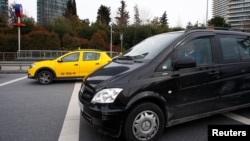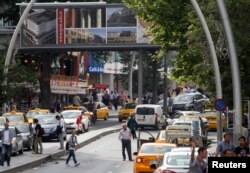The roads of Turkey’s largest city, Istanbul, are the scene of an increasingly bitter confrontation between taxi drivers and drivers of the new ride-hailing service Uber. Numerous videos shot by terrified Uber passengers are circulating on the internet that show taxi drivers attacking Uber vehicles.
Ubers are easily spotted as they invariably are black or white mini vans. “We experience personally verbal attacks, as well as increasing violence like kicking and attacking our cars, as well as blocking our way,” explained 22-year-old Mehmet, who only wanted to give his first name. “Yesterday, in Ortakoy district [of Istanbul] three taxis cut my way and didn’t let me pass," he said.
“Some other colleagues experienced harsher attacks. There are cases of armed attacks, including guns or clubs. It happens usually at night,” added Mehmet.
Local media have reported Uber drivers being called out to remote locations, where they have been attacked by unknown assailants. Accusation of violence are denied by the taxi industry.
Operating costs
Operating a taxi is a major investment in Turkey, with taxi plates costing nearly $385,000. For drivers it often involves investing life savings or borrowing. Although most of Istanbul’s 18,000 plates are bought by wealthy investors who rent out the plates, drivers pay around $2000 a month to rent a taxi. With the high cost of gasoline in Europe, many drivers complain life was already hard, even before the emergence of Uber.
“Even though we say we are against violence, they [Uber] are provoking us to use force,” vented Mehmet Aktas a taxi driver of 17 years. “We are working until 3 or 4 in the morning to make so little money. Why do I have to share the little that I make with an Uber driver. Our income has fallen 30-35 percent [because of Uber] and our expenses have increased. Every day is worse than the day before. Our country is in a dire economic situation,” said Aktas.
But the attacks on Ubers have seen many people rally to their support. Comments on social media appear to be overwhelmingly in favor of Uber, with “#idon’tusetaxis” and “#don’ttouchuber” becoming trending hashtags in Turkey.
“If I go to the airport or take a longer journey, I take Uber, because its more spacious, its more reliable, they are on time,” said 26-year-old designer Mehmet. “Even though sometimes it’s more expensive, I prefer Uber.“
“It's also safe, you are in a system you call Uber from that system so it's safe,” claimed Nilufer, a student.
Popular option
Unlike in many other countries, Uber in Turkey is usually a little more expensive than taxis. But the usually modern minivans, which offer generous space, are proving increasingly popular in Istanbul in contrast with often cramped and old taxis.
Uber’s system of paying an agreed fee by credit card in advance is especially popular among many Istanbul users. Many people in Istanbul have stories of being overcharged by taxi drivers. There is a recent story that made headline news and remains the talk of the city involving a Saudi tourist who wanted to go to the airport and was taken on an hours-long tour of the city. It cost him several hundred dollars and he missed his flight.
But taxi drivers counter they are facing unfair competition. Earlier this month, the Chamber of Istanbul Taxi Businesses filed a court case accusing Uber of running an unlicensed taxi service. The Chamber represents 50,000 drivers with 18,000 licensed cabs. Hundreds of drivers turned up at Istanbul’s main courthouse in support of the case. Drivers chanted “Uber thieves” and “we will crush Uber.”
Addressing the drivers and the media, Eyup Aksu, head of the Chamber of Istanbul Taxi Businesses, said the display of anger is a warning.
"We don’t want to do a protest like the protest of the taxi drivers in Europe, who burnt and destroyed areas. But if our parliament doesn’t carry out the necessary regulation, and if the judiciary gives a contrary decision to what we are demanding, then the patience of the taxi drivers will run out, and they will do anything for their bread and for their work,” said Aksu.
Observers point out the taxi drivers do have a powerful patron in Turkish President Recep Tayyip Erdogan. The drivers are traditionally among his most loyal supporters, and the president has always prided himself on being their advocate.
“Taxi drivers have always supported the president, he must now support us,” said taxi driver Ahmet Kaptan.






